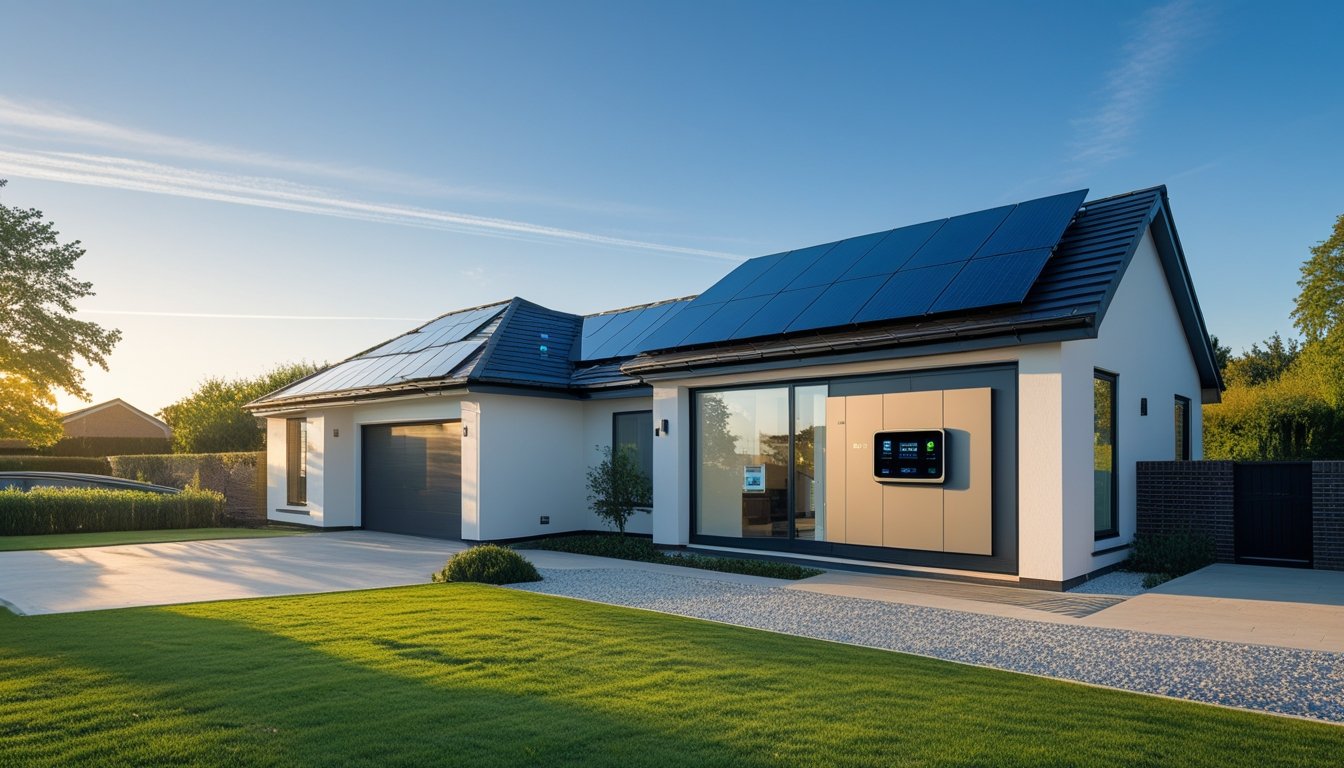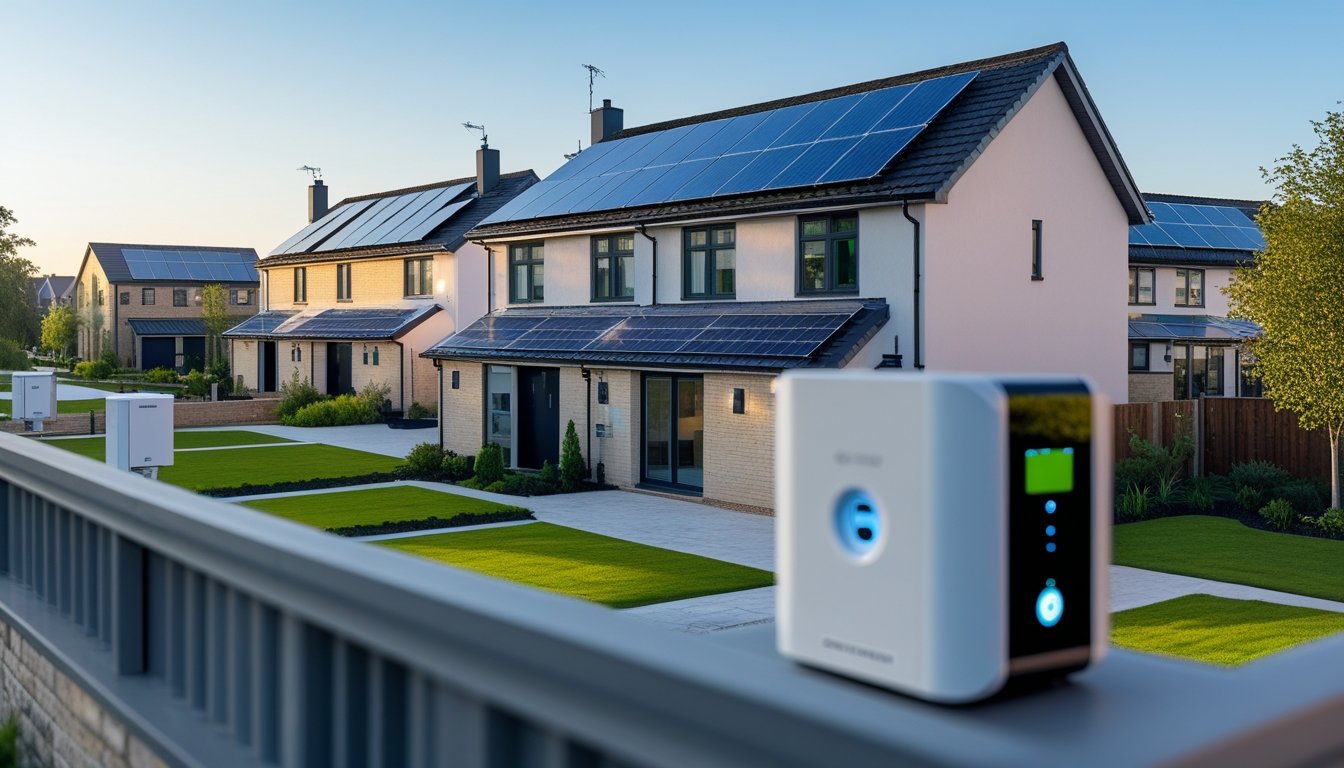Late updated: 18 Jul 2025 09:07
Written by: Eleanor Hartman
The Role Of Energy Storage In Future UK Homes: Transforming Efficiency and Sustainability
Energy storage systems are pivotal in shaping the future of UK homes. They offer us the ability to harness and store renewable energy efficiently, reducing our reliance on the grid and cutting down on carbon emissions. As more households adopt these technologies, we are stepping into an era where energy independence and sustainability are achievable for everyone.

The benefits of integrating smart energy storage are manifold. It not only translates to significant cost savings on energy bills but also contributes to a more resilient and flexible energy system within our homes and across the country. The rapid advancements in battery technology and growing market confidence assure us of lower costs and broader accessibility.
As we move towards a sustainable future, embracing energy storage becomes essential in achieving the UK’s net-zero targets. This transition isn't merely about saving money; it’s about securing our environmental future. Energy storage solutions play a vital role by enhancing energy efficiency and providing the backbone for a greener, low-carbon grid.
Key Takeaways
- Energy storage is crucial for sustainable UK homes.
- It offers cost savings and boosts energy independence.
- Essential for achieving net-zero targets.
Energy Storage Solutions Transforming Future UK Homes
As we move towards more sustainable energy practices, energy storage solutions are set to play a pivotal role in future UK homes. By integrating energy storage systems, homes can become more energy-efficient, reduce reliance on the grid, and better utilise renewable energy sources.
Battery Storage for Domestic Renewable Integration
Battery storage is crucial in harnessing the power of renewables like solar PV panels and wind energy. These storage systems allow us to capture excess energy produced during peak generation times and store it for use during high-demand periods or at night. A variety of technologies, such as lithium-ion, flow, and zinc batteries, are making their way into the market, offering diverse options for energy storage.
Home battery installations enable households to optimise their energy consumption, potentially leading to lower energy bills. Additionally, integrating battery storage with solar PV panels can significantly enhance a home’s energy independence. This shift not only reduces carbon footprints but also aligns with the UK's Future Homes Standard, promoting sustainable building practices.
Thermal Energy Storage Systems and Flexibility
Thermal energy storage systems provide another layer of flexibility to how we manage energy in homes. These systems store thermal energy in forms like heat batteries or hot water cylinders, enabling the accumulation of heat during low-demand periods. This stored energy can then be utilised when demand spikes, improving overall energy efficiency.
Heat pumps work synergistically with thermal store systems, thereby enhancing the potential to maintain a consistent and comfortable home environment. The integration of thermal energy storage with other home systems offers the potential for reducing reliance on conventional heating methods, which are often less efficient and more costly.
Integration with Smart Home Technologies
Incorporating energy storage with smart home technologies is revolutionising the way households manage energy consumption. Smart meters, for example, allow us to monitor and control energy usage more efficiently. By connecting battery storage systems with smart grids, it's possible to respond dynamically to real-time energy demands.
Homeowners can leverage this technology to automate energy savings and maximise the use of stored energy. Integration with smart systems further supports sustainability by enabling informed decision-making based on energy availability and market prices. This technology-driven approach is paving the way for more adaptable and resilient energy management in homes.
Types of Home Battery Technologies
Various battery technologies are available for home energy storage, each with its own benefits. Lithium-ion batteries are the most popular due to their efficiency and compact size. They deliver reliable performance for both standard and retrofit storage solutions. Meanwhile, emerging sodium sulphur and iron air batteries offer promising alternatives with unique advantages like longer cycle life and lower costs.
Flow batteries offer scalable storage solutions ideal for larger applications, while zinc batteries provide an environmentally friendly option due to their non-toxic materials. Standalone and consumer-scale battery storage options ensure households can choose the right system for their specific energy needs, contributing significantly to future home efficiency.
The Impact of Energy Storage on Net Zero and the UK Energy Landscape

Energy storage significantly affects the UK's journey toward net-zero emissions. By supporting renewable energy sources and ensuring grid stability, storage solutions are vital. Moreover, industry initiatives and evolving policies are shaping the future of UK energy.
Decarbonisation and Net Zero Carbon Emissions Targets
Our path to decarbonisation is deeply intertwined with net zero carbon emissions targets. As fossil fuel energy generation decreases, the decarbonisation of power becomes crucial. The UK government is focusing on the electrification of various sectors, including transport. Electric vehicles (EVs) play a pivotal role in reducing reliance on gas plants.
Battery storage is essential for balancing the fluctuating nature of renewable energy resources. By integrating technologies like solar energy and wind energy, we work towards sustainable energy practices. The Future Homes Standard (FHS) supports this by mandating energy-efficient features for new builds.
The Role of Energy Storage in Supporting Renewable Electricity and Grid Stability
Energy storage fortifies our electricity grid by addressing the variability of renewable energy. Grid-scale battery storage helps manage fluctuations in electricity production from sources like wind and solar. Programs like GivEnergy aim to increase battery storage capacity, ensuring constant energy supply. Hydropower, specifically pumped-storage systems, provides additional support.
The integration of battery storage projects enhances grid reliability and security. RenewableUK advocates for expanded use of existing technologies to support renewable electricity. Meanwhile, demand flexibility services aid in maintaining grid stability. This coordination is vital for the UK to achieve net zero.
Policy, Regulation, and Industry Developments
Government policies and industry developments drive energy storage advancements. The Microgeneration Certification Scheme (MCS) and Mandatory Solar Panels on new homes encourage energy innovation at a domestic level. Large-scale projects benefit from EnergyPulse energy storage reports and insights.
Regulatory bodies like the Electricity System Operator ensure that our grid adapts to upcoming challenges. Industry players, such as Aurora Energy Research, influence the landscape by supporting emerging technologies like GivBack. Our collaboration helps achieve targets by incorporating storage solutions into broader energy policy frameworks.
Frequently Asked Questions

In the UK, home energy storage systems are proving integral to sustainable living by harnessing renewable energy and promoting energy efficiency. These systems not only contribute to the nation's clean energy objectives but also offer potential cost savings and grid stability.
What innovative technologies are emerging in UK home energy storage?
Solid-state batteries and intelligent storage solutions are at the forefront of innovation. These technologies promise better energy density, enhanced safety, and more efficient energy use. As technology advances, these improvements will likely become more accessible to homeowners.
How does home energy storage contribute to the UK's renewable energy targets?
Storing renewable energy such as solar or wind generated during optimal conditions helps maximise usage and reduces reliance on fossil fuels. This practice aids in achieving the UK’s renewable energy targets by smoothing out inconsistencies in power supply and demand.
What government incentives are available for installing energy storage systems in UK homes?
Several government schemes and incentives exist, such as grants and financing options that support the installation of energy storage systems. These incentives aim to reduce the initial costs for homeowners, thereby promoting greater adoption of home energy storage.
What are the safety regulations for residential energy storage systems in the UK?
Safety regulations for energy storage systems focus on installation standards and operational protocols. Compliance with these regulations ensures that systems are installed safely, minimising risks associated with electrical faults and ensuring long-term reliability for UK households.
How does energy storage impact the UK's electricity grid stability?
By storing excess energy during low demand periods and releasing it during peak times, energy storage systems help stabilise the grid. This load balancing reduces strain on the electricity network, preventing outages and enhancing overall grid reliability.
What is the estimated cost of installing a home energy storage system in the UK?
UK homeowners can expect to pay between £5,000 and £7,000 for a solar battery storage system. This price range offers a good benchmark, though actual costs can vary based on system capacity and specific requirements of each household. Long-term savings on energy bills can help offset these initial expenses.